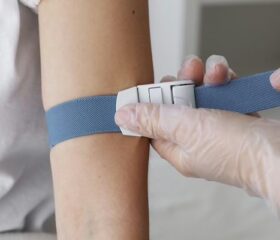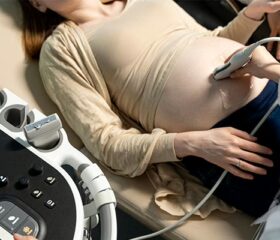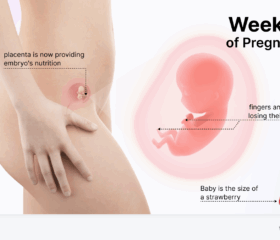Chorionic Villus Sampling (CVS): Benefits, Risks, & Results
If you're in your first trimester and feeling overwhelmed by prenatal testing options, you're not alone. One optional test many expecting moms choose to get is chorionic villus sampling.

- What is chorionic villus sampling?
- Who should consider chorionic villus sampling?
- How is chorionic villus sampling performed?
- What to expect after chorionic villus sampling
- How accurate is chorionic villus sampling?
- What happens if the CVS testing turns up a problem?
- Is chorionic villus sampling safe?
Chorionic villus sampling (CVS) can give you detailed insight into your baby’s genetic health earlier than other testing options. It’s not for everyone, but for some parents-to-be, it offers clarity at a time when there are still plenty of unknowns.
Here’s what you need to know about CVS, including what it is, what it tests for, how your doctor performs it, and how to decide whether it’s right for you.
What is chorionic villus sampling?
Chorionic villus sampling is a prenatal diagnostic test typically performed between 10 weeks and 13 weeks of pregnancy. The test involves collecting a small tissue sample from the chorionic villi—tiny, finger-like projections on the placenta that usually share the same genetic material as your baby. 1
Because this tissue reflects your baby’s chromosomes, CVS can detect certain genetic and chromosomal conditions early on, potentially weeks before other diagnostic options like amniocentesis are available. 2
What can CVS detect?
CVS can diagnose chromosomal abnormalities like Down syndrome (trisomy 21), trisomy 18, trisomy 13, and sex chromosome differences like Turner syndrome.
It can also spot hundreds of inherited diseases, such as Tay-Sachs disease, cystic fibrosis, sickle cell anemia, and muscular dystrophy. 3
Your doctor or genetic counselor can tell you which specific conditions to test for based on your family history and personal risk factors.
While CVS can confirm whether your baby has a condition, it won’t indicate how mild or severe it may be. 4
What’s the difference between chorionic villus sampling and amniocentesis?
While both CVS and amniocentesis are diagnostic tests, CVS is performed earlier in pregnancy (10–13 weeks), while you’ll usually get amniocentesis when you’re between 15 weeks and 20 weeks pregnant. 3
With CVS, your doctor takes a tissue sample from your placenta’s chorionic villi, while amniocentesis involves testing a sample of the amniotic fluid that surrounds your baby.
Moreover, while both tests can detect chromosomal abnormalities and many genetic disorders, amniocentesis can also detect neural tube defects, which CVS cannot. 3 If that’s a major concern for you, talk to your doctor about whether amniocentesis might be a better option.
Who should consider chorionic villus sampling?
While CVS isn’t part of routine prenatal care, your doctor may recommend it if there’s a higher-than-average chance that your baby might have a genetic or chromosomal condition.
For example, your doctor may suggest CVS if you’ll be 35 or older at your due date, as your baby will be more at risk of chromosomal abnormalities like Down syndrome. They may also suggest it if: 5
- Your early screening tests, such as the nuchal translucency (NT) scan, bloodwork, or noninvasive prenatal testing (NIPT), showed concerning results.
- You or your partner is carrying any genetic disorder, like cystic fibrosis or sickle cell disease.
- You had a previous pregnancy affected by a genetic condition.
- You have a family history of genetic disorders or chromosomal abnormalities.
- A pregnancy ultrasound shows structural concerns in your baby.
How is chorionic villus sampling performed?
Your doctor will perform CVS in one of two ways, depending on the location of your placenta. 5 Regardless of the approach, the actual sample collection only takes a few minutes, although you’ll likely be at the appointment for about 30 minutes total. 6
Throughout the procedure, your doctor will ensure your baby is safe by monitoring him on an ultrasound.
Transcervical CVS
If you get transcervical CVS, you’ll lie on your back, and your doctor will guide a thin, flexible catheter through your vagina and cervix to the placenta. Using an ultrasound to help guide placement, your doctor will gently suction a tiny sample of chorionic villi.
This method may feel similar to a pap smear, though some people report mild to moderate cramping or pressure during the procedure. Some research suggests this approach may be slightly less uncomfortable than the transabdominal method. 7
Transabdominal CVS
If you get transabdominal CVS, your doctor will insert a needle through your abdomen (after cleansing and, in some cases, numbing the area with local anesthetic) and into the uterus. Again, an ultrasound will help them guide the needle to the placenta, where they will collect a small sample.
What to expect after chorionic villus sampling
After the procedure, plan to take it easy. Most people experience mild cramping or light spotting, which is completely normal. 8 You’ll want to rest for the remainder of the day—arrange for someone to drive you home just in case you feel lightheaded.
Avoid strenuous activity, including exercise and sex, for at least 1–2 days (or longer if your doctor advises).
Call your doctor right away if you have heavy bleeding, a fever, contractions, or fluid leaking from your vagina. 1
You may need a RhoGAM shot after CVS
If you’re Rh-negative, your doctor will probably give you a RhoGAM shot after the procedure to prevent Rh sensitization (when your baby is Rh-positive and your body creates antibodies that attack him). 6 Getting the shot will protect your baby if his blood mixes with yours during the test.
How accurate is chorionic villus sampling?
CVS is typically 98%–99% accurate for the conditions it’s designed to detect. 9 However, like all tests, it has limitations. While this is very unlikely, you could get a false positive result from CVS.
Moreover, in about 1%–2% of cases, results may be unclear due to confined placental mosaicism (CPM), when some cells in the placenta have abnormal chromosomes while others are normal. In such cases, you might need further testing (like amniocentesis). 10 11
CVS also can’t detect all genetic or structural conditions, particularly neural tube defects like spina bifida. 12 For that, your doctor will probably recommend a second-trimester ultrasound or another screening test known as the maternal serum alpha-fetoprotein (MSAFP) test. 13
How long does it take to get results?
You’ll probably receive preliminary results in 2–4 days. 6 Full results typically take 2–4 weeks, since the lab needs time to culture the cells for a more comprehensive analysis. 6
Waiting for results can be nerve-wracking. You may find it helpful to speak with a genetic counselor while you wait so that you can process the uncertainty and feel more grounded in your next steps.
What happens if the CVS testing turns up a problem?
If your results indicate a potential concern, your doctor will probably refer you to a genetic counselor who’ll help you interpret the results. You may also meet with a maternal-fetal medicine (MFM) specialist to discuss your options and the next steps.
You’ll have time to think about what’s best for you—whether that means preparing for a baby with special needs, undergoing further testing, or considering other choices, including termination (abortion).
No matter the outcome, you don’t have to go through this alone. There are support groups, therapists, and counselors who specialize in helping families navigate complicated or unexpected prenatal diagnoses.
Is chorionic villus sampling safe?
CVS is generally considered safe when performed at a center with experienced providers. Still, like any medical procedure, it comes with risks. You’ll have around a 1 in 300 to 1 in 500 risk of miscarriage if you get CVS after 10 weeks, even if it’s performed by a skilled practitioner. 3
Other potential complications include getting an infection after the procedure (though this rarely happens) and limb abnormalities for your baby, which usually won’t happen if you get CVS after the 10-week mark. 5
To reduce your risk, choose a doctor who regularly performs CVS and ask about their procedure-specific miscarriage rate.
Should you get chorionic villus sampling?
According to ACOG (the American College of Obstetricians and Gynecologists), all pregnant women should be offered the option of screening and diagnostic testing, like CVS, regardless of age. 14
However, choosing whether or not you want CVS is a personal decision. If you want answers early, CVS can give them to you earlier than most other tests. Still, the small risk of miscarriage and the potential of facing uncomfortable results may be enough to put you off.
Take the time you need to decide if CVS is right for you. Whatever you decide, know that you’re doing your best for your baby and your family.
Article Sources
- MedlinePlus. "Chorionic Villus Sampling (CVS)" Retrieved August 11, 2025.
- Office on Women's Health. "Prenatal care and tests" Retrieved August 11, 2025.
- Centers for Disease Control and Prevention. "Chorionic Villus Sampling and Amniocentesis: Recommendations for Prenatal Counseling" Retrieved August 11, 2025.
- Centers for Disease Control and Prevention. "Diagnosis of Birth Defects" Retrieved August 11, 2025.
- StatPearls. "Chorionic Villus Sampling" Retrieved August 11, 2025.
- MedlinePlus. "Chorionic villus sampling" Retrieved August 11, 2025.
- Journal of Pain Research. "Maternal anxiety and its correlation with pain experience during chorion villus sampling and amniocentesis" Retrieved August 11, 2025.
- Johns Hopkins Medicine. "Chorionic Villus Sampling (CVS) Patient Information" Retrieved August 11, 2025.
- Expert Review of Molecular Diagnostics. "Prenatal diagnosis: update on invasive versus noninvasive fetal diagnostic testing from maternal blood" Retrieved August 11, 2025.
- Human Reproduction Update. "Confined placental mosaicism and the association with pregnancy outcome and fetal growth: a review of the literature" Retrieved August 11, 2025.
- Carnegie Imaging. "Confined Placental Mosaicism" Retrieved August 11, 2025.
- Johns Hopkins Medicine. "Chorionic Villus Sampling (CVS)" Retrieved August 11, 2025.
- Mayo Clinic. "Spina bifida" Retrieved August 11, 2025.
- American College of Obstetricians and Gynecologists. "NIPT Summary of Recommendations" Retrieved August 11, 2025.







